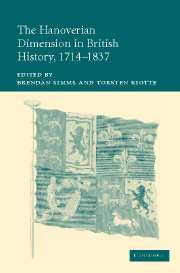Book contents
- Frontmatter
- Contents
- List of genealogical tables
- List of tables
- Notes on contributors
- Acknowledgements
- 1 Introduction. Hanover: the missing dimension
- 2 Hanoverian nexus: Walpole and the Electorate
- 3 Pitt and Hanover
- 4 George III and Hanover
- 5 The Hanoverian dimension in early nineteenth-century British politics
- 6 The end of the dynastic union, 1815–1837
- 7 The university of Göttingen and the Personal Union, 1737–1837
- 8 The confessional dimension
- 9 Hanover and the public sphere
- 10 Dynastic perspectives
- 11 British maritime strategy and Hanover 1714–1763
- 12 Hanover in mid-eighteenth-century Franco-British geopolitics
- 13 Hanover and British republicanism
- Index
4 - George III and Hanover
Published online by Cambridge University Press: 13 July 2009
- Frontmatter
- Contents
- List of genealogical tables
- List of tables
- Notes on contributors
- Acknowledgements
- 1 Introduction. Hanover: the missing dimension
- 2 Hanoverian nexus: Walpole and the Electorate
- 3 Pitt and Hanover
- 4 George III and Hanover
- 5 The Hanoverian dimension in early nineteenth-century British politics
- 6 The end of the dynastic union, 1815–1837
- 7 The university of Göttingen and the Personal Union, 1737–1837
- 8 The confessional dimension
- 9 Hanover and the public sphere
- 10 Dynastic perspectives
- 11 British maritime strategy and Hanover 1714–1763
- 12 Hanover in mid-eighteenth-century Franco-British geopolitics
- 13 Hanover and British republicanism
- Index
Summary
Every historian dealing with George III's relationship with Hanover will sooner or later address the letter George, as a young prince, wrote to his mentor and ‘dearest friend’ John Stuart, Earl Bute on 5 August 1759. In a short note to Bute the future monarch commented on the policies of his grandfather, the reigning King George II, and the latter's conduct of what would become the Seven Years War. The young prince showed little understanding for what he thought to be his grandfather's favouritism towards Hanover. Writing on the military affairs in the North of Germany he referred to the king's German dominions as ‘that horrid Electorate that has always lived upon the very vitals of our poor country’. In the light of this emotional statement it appears a convincing argument that with the accession of George III in 1760 the relationship between the monarch and the Electorate of Hanover changed fundamentally.
A radical change in the importance of the dynastic union after 1760 seemed even more convincing due to George III's emphasis on his British origins. As the monarch stated when opening the first parliamentary session of his reign in 1761 he saw himself as genuinely British: ‘Born and educated in this country I glory in the name of Britain.’ The majority of historians have accepted this statement as the core of George III's political beliefs and as an argument against the importance of the dynastic union under the third Hanoverian.
- Type
- Chapter
- Information
- The Hanoverian Dimension in British History, 1714–1837 , pp. 58 - 85Publisher: Cambridge University PressPrint publication year: 2007
- 1
- Cited by

